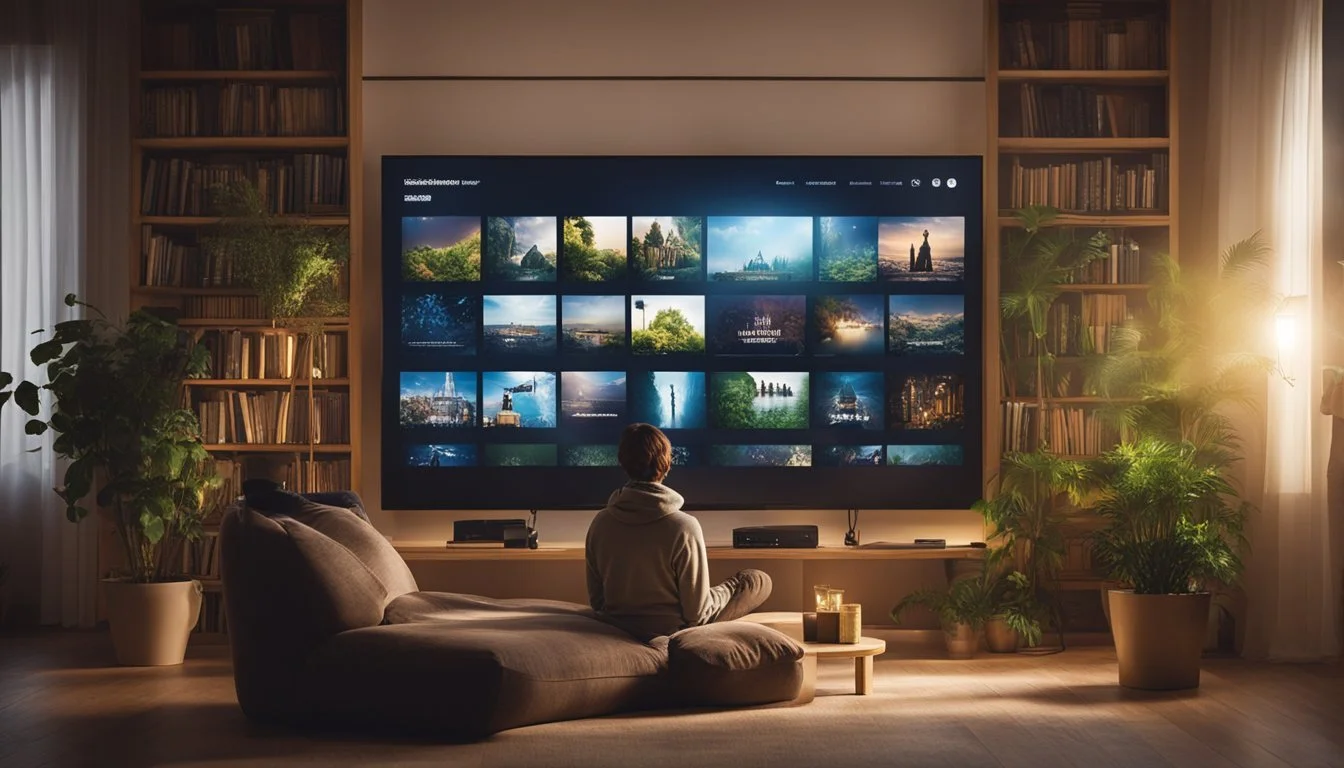6 Documentaries That Investigate the Impact of Love on Mental Well-being
Exploring Emotional Connections and Psychological Health
Documentaries exploring the intersection of love and mental health offer unique insights into the human experience. These films examine how relationships, intimacy, and emotional connections impact psychological well-being. Through personal stories and expert perspectives, they shed light on the complex interplay between love and mental states.
Viewers can gain a deeper understanding of how love influences mental health by watching these thought-provoking documentaries. The films cover various aspects of love, from romantic partnerships to family bonds, and their effects on emotional stability, self-esteem, and overall psychological functioning. By presenting real-life examples and scientific research, these documentaries provide valuable information on nurturing healthy relationships and promoting positive mental health outcomes.
1) 'Crazy, Not Insane' by Alex Gibney (2020)
'Crazy, Not Insane' is a thought-provoking documentary that explores the complex relationship between love, trauma, and mental health. Directed by Alex Gibney, the film follows the work of forensic psychiatrist Dr. Dorothy Otnow Lewis.
Dr. Lewis has spent decades studying violent criminals, particularly serial killers. She believes that childhood abuse and brain dysfunction play crucial roles in shaping violent behavior.
The documentary presents interviews with Dr. Lewis and examines her controversial theories. It challenges viewers to reconsider their perceptions of criminality and mental illness.
Gibney's film delves into the impact of early-life experiences on mental well-being. It suggests that a lack of love and nurturing during childhood can have profound consequences on an individual's psyche.
'Crazy, Not Insane' raises important questions about the nature of evil and the possibility of rehabilitation. It encourages viewers to consider the role of empathy and understanding in addressing mental health issues.
More information on 'Crazy, Not Insane' (IMDb)
2) 'Love Between the Covers' by Laurie Kahn (2015)
'Love Between the Covers' explores the world of romance fiction and its impact on readers' emotional well-being. The documentary showcases the powerful community of women who write and read romance novels.
Filmmaker Laurie Kahn interviews bestselling authors and devoted readers, revealing how romance literature provides comfort, empowerment, and connection. The film highlights the genre's ability to foster positive mental health outcomes for its audience.
Through intimate conversations, 'Love Between the Covers' demonstrates how romance novels offer escapism and emotional support during challenging times. It also examines the genre's role in promoting self-acceptance and healthy relationship ideals.
The documentary presents romance fiction as a billion-dollar industry pioneering the digital revolution. It showcases how this female-dominated field creates a global sisterhood of writers and readers, contributing to their overall sense of fulfillment and belonging.
More information on 'Love Between the Covers' (IMDb)
3) 'Life in a Day' by Kevin Macdonald (2011)
'Life in a Day' is a groundbreaking documentary that captures a snapshot of human existence across the globe on a single day. Directed by Kevin Macdonald, the film weaves together user-submitted videos from July 24, 2010.
The documentary showcases a wide range of human experiences, from mundane daily routines to profound moments of joy, sorrow, and love. It offers a unique perspective on the universal aspects of human relationships and emotions.
While not exclusively focused on love's impact on mental well-being, 'Life in a Day' provides glimpses into how love and connection shape people's lives. The film highlights the importance of human bonds in various cultures and contexts.
Macdonald's innovative approach to filmmaking allows viewers to witness authentic moments of affection, companionship, and emotional support. These scenes demonstrate the positive effects of love on individuals' mental states and overall happiness.
The documentary's global scope emphasizes the universality of love and its significance in human life, regardless of geographical or cultural boundaries.
More information on 'Life in a Day' (2011)
4) 'Won't You Be My Neighbor?' by Morgan Neville (2018)
'Won't You Be My Neighbor?' explores the life and legacy of Fred Rogers, the beloved host of 'Mister Rogers' Neighborhood'. This documentary delves into Rogers' mission to spread kindness and compassion through children's television.
Director Morgan Neville showcases Rogers' unique approach to addressing complex topics with young viewers. The film highlights how Rogers used his platform to discuss challenging subjects like death, divorce, and racism in a gentle, age-appropriate manner.
Through interviews with family, friends, and colleagues, the documentary reveals Rogers' dedication to promoting emotional intelligence and self-worth in children. It examines his belief in the power of love and acceptance to foster mental well-being.
The film demonstrates how Rogers' message of unconditional love and respect for all individuals resonated with generations of viewers. It emphasizes the lasting impact of his teachings on emotional health and interpersonal relationships.
'Won't You Be My Neighbor?' serves as a poignant reminder of the positive influence one person can have on society through kindness and empathy.
5) 'The Science of Love' - ABC News Special (2024)
'The Science of Love' explores the neurological and physiological aspects of romantic love. This ABC News special delves into how our brains react when we experience love and attraction.
The documentary examines the brain's behavioral activation system (BAS) and its connection to feelings of being "in love." It presents findings from a survey of over 1,500 young adults, focusing on their emotional responses and behaviors related to romance.
Experts discuss the chemical reactions that occur in the brain during love, including the release of dopamine and norepinephrine. These neurotransmitters are linked to feelings of pleasure and craving, explaining why people desire to spend more time with their romantic partners.
The special also investigates how love activates similar brain regions as addictive substances like cocaine. It explores the concept of love as a drive rather than just an emotion, highlighting its profound impact on both the brain and body.
More information on ABC News specials
6) 'In Bed with Chris Needham' by Paul Greengrass (1993)
'In Bed with Chris Needham' offers a raw glimpse into the life of a 17-year-old metalhead from Loughborough, England. The documentary captures Chris's passionate pursuit of his musical dreams and his relationship with his girlfriend.
The film presents an unfiltered look at teenage angst and the quest for identity. Chris's verbose and charismatic personality shines through as he shares his thoughts on metal music, his band Manslaughter, and life in a small British town.
Shot in a video diary format, the documentary showcases the authenticity of 1990s youth culture. The unprocessed video footage and flat lighting emphasize the gritty reality of Chris's world, from his mullet hairstyle to the dreary shopping precincts of Loughborough.
Despite being aired only twice on BBC2, 'In Bed with Chris Needham' has achieved cult status. Its honest portrayal of teenage life and love resonates with viewers, offering insights into the impact of passion and relationships on adolescent mental well-being.
More information on 'In Bed with Chris Needham'
The Connection Between Love and Mental Health
Love profoundly influences mental well-being through various psychological and physiological mechanisms. It shapes our emotions, behaviors, and overall psychological health in significant ways.
Psychological Benefits of Love
Love promotes a sense of security and belonging, which are fundamental to good mental health. It boosts self-esteem and confidence, helping individuals feel valued and appreciated. Romantic relationships can provide emotional support during challenging times, reducing feelings of loneliness and isolation.
Loving partnerships often encourage personal growth and self-improvement. Partners may motivate each other to pursue goals and overcome obstacles. This mutual support can lead to increased life satisfaction and a more positive outlook.
Love also enhances emotional intelligence. Through intimate relationships, people learn to better understand and express their own emotions, as well as empathize with others.
The Role of Love in Stress Reduction
Love acts as a natural stress buffer. Physical affection, such as hugging or holding hands, triggers the release of oxytocin, often called the "love hormone." This neurochemical helps lower cortisol levels, reducing stress and anxiety.
Supportive relationships provide a safe space to share concerns and worries. This emotional outlet can prevent the buildup of stress and negative emotions. Having a loving partner to confide in can make life's challenges seem more manageable.
Shared activities and quality time with loved ones promote relaxation and joy. These positive experiences counteract the effects of daily stressors and contribute to overall mental well-being.
Effects of Love on Emotional Well-being
Love profoundly shapes our emotional landscape, influencing mood and psychological health. Research indicates that loving relationships can boost happiness, reduce stress, and enhance overall emotional resilience.
How Love Influences Mood
Love triggers the release of feel-good hormones like oxytocin and dopamine. These neurochemicals promote positive emotions and can alleviate symptoms of anxiety and depression. Studies show that individuals in loving relationships often report higher levels of life satisfaction and emotional stability.
Feeling loved and appreciated activates the brain's reward centers, creating a sense of contentment and security. This emotional foundation helps buffer against daily stressors and negative experiences.
Regular expressions of affection, such as hugs or kind words, can elevate mood and increase emotional well-being over time.
The Impact of Romantic Relationships
Healthy romantic partnerships provide emotional support and companionship, which are crucial for mental health. Partners often serve as confidants and sources of comfort during challenging times.
Research suggests that individuals in satisfying romantic relationships tend to have:
Lower levels of stress and anxiety
Improved self-esteem
Greater emotional regulation skills
Enhanced ability to cope with life's challenges
The shared experiences and mutual growth within a romantic relationship can foster personal development and emotional maturity. Couples who communicate effectively and support each other's goals often report higher relationship satisfaction and individual well-being.





